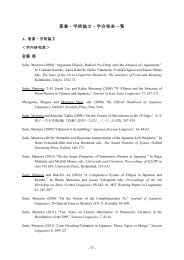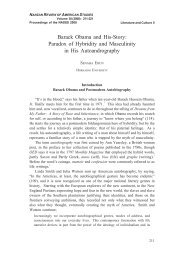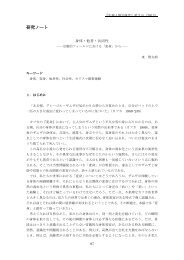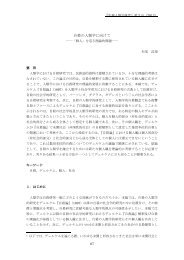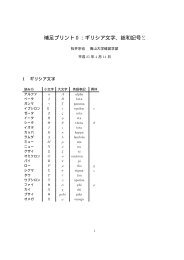INTRA- AND INTER-RELIGIOUS DIALOGUE IN ... - 南山大学
INTRA- AND INTER-RELIGIOUS DIALOGUE IN ... - 南山大学
INTRA- AND INTER-RELIGIOUS DIALOGUE IN ... - 南山大学
You also want an ePaper? Increase the reach of your titles
YUMPU automatically turns print PDFs into web optimized ePapers that Google loves.
南 山 大 学 アジア・ 太 平 洋 研 究 センター 報<br />
第 7 号<br />
an IA<strong>IN</strong> student. He standed up and said loudly through microphone, “I know<br />
that most of you disagree with Qasim Mathar’s tolerant and pluralist views.<br />
But I myself agree with him. I think we should follow his views if we want to<br />
have inter-religious harmony...” He suddenly stopped talking, and apparently<br />
fell down because a few of Wahdah Islamiyyah students hit him. The seminar<br />
became chaotic. Many participants left the seminar building, including the<br />
IA<strong>IN</strong> student. He said loudly, “I will take revenge!” When he was outside the<br />
building with a crowd, a Wahdah Islamiyyah teacher said to him, “Do you want<br />
to take revenge? Please hit me!” Without further ado, the IA<strong>IN</strong> student hit the<br />
teacher. Everybody was shocked for a moment. Then, many students of the<br />
Wahdah wanted to attack the IA<strong>IN</strong> student, but their teacher prevented them.<br />
“It is finished, it is done,” he said. They finally shook hands to forget and<br />
forgive what happened.<br />
The Makassar case is not the only experience I have regarding the problems<br />
of intra-religious dialogue among Muslims. From 2007 up to the present (2011),<br />
I have participated in several intra-Muslim dialogues. Tensions frequently arise<br />
during the discussion. On one ocassion, I was invited to be a moderator of a<br />
discussion on the issue of Islamic brotherhood. It was in Banjarbaru, a district<br />
20 kilometers from the capital, Banjarmasin, South Kalimantan. The speakers<br />
were Muhammad al-Khattath, the national leader of Hizbut Tahrir Indonesia<br />
(HTI), Anwar Abbas, the national leader of Muhammadiyah, and Said Agiel<br />
Siradj, the leader of Nahdlatul Ulama (NU). These three speakers were<br />
considered representatives of different Islamic organizations in Indonesia: the<br />
Muhammadiyah is reformist, the NU is traditionalist and the HTI is transnationalist.<br />
From the very beginning, the organisers realized that tensions could easily<br />
emerge. Therefore, they asked me as a moderator to manage the discussion in<br />
such a way that everybody could feel comfortable. Having made a few<br />
introductory remarks, I gave the first opportunity to al-Khattath. As the leader<br />
of the HTI, he explained that his organisation’s primary work is in the field of<br />
―<br />
10<br />
―




